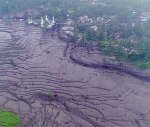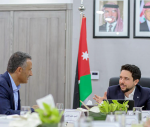You are here
A good line from a Jewish father
Dec 04,2014 - Last updated at Dec 04,2014
Will the real Benjamin Netanyahu now stand up and be counted?
Here is the Israeli prime minister’s last chance to tell his fellow citizens, once and for all, Jews and Arabs, his honest thinking about a final Palestinian-Israeli peace settlement, something he has never revealed.
The Palestinians have conceded more than half of their share of their homeland, in accordance with 1948 Partition Plan of Palestine.
The Jewish community was then, surprisingly, awarded 55 per cent of the former British colony, but controls now more than 78 per cent of Palestine, excluding the Israeli-occupied territories beyond the 1967 armistice line where some 500 illegal Israeli settlements have been established since then.
The breakup of Netanyahu’s coalition government, tormented by ongoing bickering, and the parliamentary election slated some time in March or April, comes at times of serious economic problems and a controversial Jewish nation-state bill that critics say discriminates against Israel’s Arab citizens, who number more than one-fifth of Israeli citizens.
Netanyahu, Israel’s second longest-serving prime minister and leader of the rightist Likud Party, is expected, according to two television polls held last Tuesday, to win the national election if it is held in the near future. If so, he will be serving a fourth term as prime minister.
Netanyahu dismissed Finance Minister Yair Lapid and Justice Minister Tzipi Livni, two prominent centrist ministers. He claimed that Lapid and Livni have been engaged in behind-the- scene attempts to form an alternative coalition government.
Livni denied the accusation and claimed that Netanyahu had been trying to replace her and Lapid.
An issue that recently started preoccupying the Knesset and the Israeli people is the nation-state legislation which won Cabinet approval more than a week ago.
Livni, according to Reuters, “fell out with Netanyahu over the nation-state legislation … [and] she has looked uncomfortable in the government ever since peace negotiations with the Palestinians collapsed in April.
Reuters believes that “a new mandate could give Netanyahu more leeway domestically to pursue his expansionist settlement policies on occupied land Palestinians seek for a state. It will also allow the prime minister to push ahead with the Jewish nation-state bill that he says is essential to protecting Israel’s Jewish identity”.
For a clearer situation of life in Jerusalem, the opening paragraph by Nathan Thrall in the “London Review of Books” tells it like it is: “What the government of Israel calls its eternal, undivided capital is among the most precarious, divided cities in the world. When it conquered the eastern part of Jerusalem and the West Bank — both administered by Jordan — in 1967, Israel expanded the city’s municipal boundaries threefold. As a result, approximately 37 per cent of Jerusalem’s current residents are Palestinians. They have separate buses, schools, health facilities, commercial centres, and speak a different language.
“In their neighbourhoods, Israeli settler and border policy are frequently pelted with stones, while Palestinians have on several occasions recently been beaten by Jewish nationalist youths in the western half of the city.
“Balloons equipped with cameras hover above East Jerusalem, maintaining surveillances over the Palestinian population. Most Israelis have never visited and don’t even know the names of the Palestinian areas their government insists on calling its own. Municipal workers come to these neighbourhoods with police escorts.”
A shocking incident last week in Jewish-dominated West Jerusalem, according to The Washington Post’s William Booth, was when “arsonists who police suspect are Jewish extremists torched a first-grade classroom and scrawled racist graffiti on the walls of one of the few Arab-Hebrew bilingual schools in Israel”.
The slogans that were spray painted on the walls outside the classrooms declared “Death to Arabs” and “There is no coexistence with cancer”.
Paz Cohen, chairman of the Jerusalem parent-teacher association, whose daughter is one of the 600 students who attend the school, is committed not only to shared languages but also to coexistence between Jews and Arabs.
The students are taught about Christian, Jewish and Muslim cultures and religious beliefs.
“We live in a city with many different people,” Cohen told the Post.
“It is important for my daughter to keep her Jewish identity but also important for her to learn who else lives here.”
It is now time for Netanyahu and his key supporter, America, to absorb this line.
The writer is a Washington-based columnist.












